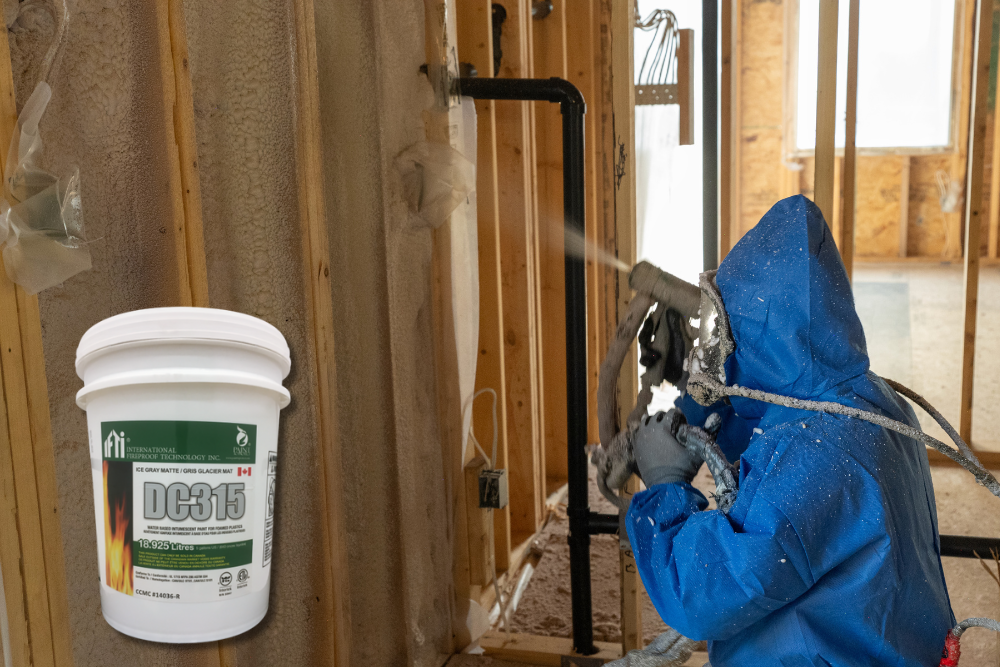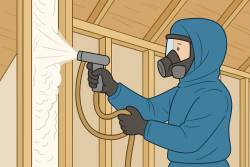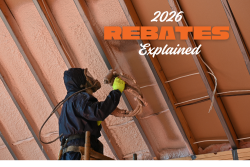In the bustling city of Waterloo, spray foam insulation has gained popularity for its efficiency in temperature regulation and energy conservation. However, a critical aspect often overlooked is the relationship between spray foam insulation and fireproofing. This discussion is pivotal, especially considering the requirements of the Ontario Building Code and the specific needs of projects in Waterloo.
Spray Foam Insulation and Fire Proofing in Waterloo: Expert Guide and Best Practices
Addressing Common Misconceptions
First, it's essential to address a common query: should spray foam insulation be covered? The answer largely depends on the type of spray foam used. For instance, closed-cell 2-lb density spray foam does not require a vapour barrier, a component that's otherwise necessary for other insulation materials. This characteristic significantly simplifies the insulation process in many Waterloo projects.
However, misconceptions abound regarding the need to cover spray foam due to off-gassing concerns. It's vital to understand that spray foam is a two-part product that reacts quickly and becomes inert seconds after application, eliminating off-gassing worries. Despite this, there are scenarios where thermal barriers must be placed over spray foam insulation for safety and compliance.
Understanding Thermal Barriers
A thermal barrier protects against thermal damage in fire situations. According to the Ontario Building Code, foam insulation products within a building's envelope in Waterloo must be shielded with a 15-minute thermal barrier. This regulation applies to various materials, including foam boards, spray foam, ICF blocks, and other foamed plastic products.
Homeowners and contractors in Waterloo have multiple options to meet this requirement. The most common solution is the use of ½" drywall board. Alternative options include Monocote z-3306, a cementitious spray-on product, and DC315, an intumescent paint product. The latter, approved for use in Canada in 2015, has gained popularity in Waterloo for situations where a thermal barrier is needed, but drywall is impractical.
Regulations and Requirements
Understanding the purpose of a thermal barrier is crucial. While spray foam insulation is self-extinguishing and doesn't support flame independently, it can burn in an external flame, emitting harmful smoke. The thermal barrier provides a 15-minute protection period, an essential safety feature, especially considering the many flammable objects typically found in homes.
Options for Meeting Thermal Barrier Requirements
In Waterloo, the application of thermal barriers is influenced by various factors. Any livable, heated space insulated with foam usually requires a thermal barrier in new builds or renovations with a building permit. Exceptions exist, like specific crawl spaces or attics, depending on their design and integration with living areas. However, it's always advisable to consult a building inspector in Waterloo to determine the specific requirements for a project.
Consulting Experts and Building Inspectors
In projects without direct oversight from building officials, it is recommended to consult an insulation contractor familiar with Waterloo's context for guidance on whether a thermal barrier is necessary.
In summary, the Ontario Building Code mandates that all foam insulation products within a residential building envelope in Waterloo, including spray foam insulation, should be covered with an approved thermal barrier. While drywall often fulfills this requirement, exceptional cases may warrant alternative solutions like spray-on thermal barriers.
Further Resources and Information
For more detailed information about thermal barrier requirements per the Ontario Building Codes, especially concerning spray foam insulation in Waterloo, it's advisable to consult local experts or the building code documentation. This approach ensures that your insulation choices optimize energy efficiency and adhere to safety standards, making your Waterloo property both comfortable and secure.


















